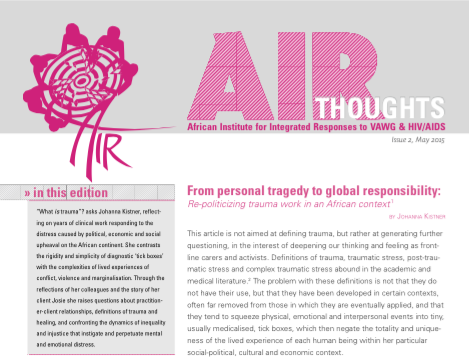“This article is not aimed at defining trauma, but rather at generating further questioning, in the interest of deepening our thinking and feeling as front-line carers and activists” writes psychologist Johanna Kistner in the second issue of AIR Thoughts. Drawing on decades of experience in providing and designing mental health services in marginalized communities in South Africa, Johanna calls into question the heavily individualized and de-politiczed models and language that are used to deal with people’s emotional and psychological distress.
“An army of emotionally overwhelmed carers and healers will not be able to hold the hand and heart of this brutalized woman or that dying child. But if we are not careful, we are dangerously at risk of losing our own humanity in the maze of tick boxes and with it our capacity to fully feel and engage with both the desperate pain and the desperate courage of another human being.”
Sharing reflections from her clinical practice and analysis of colleagues and clients, she calls for a re-politicizing of approaches to trauma work in African contexts.
Read From personal tragedy to global responsability: Re-politicizing trauma work in an African context ( AIR Thoughts Issue 2 here ).

